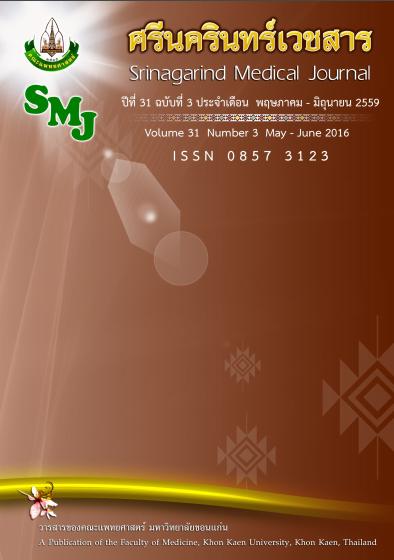Food Consumption and Exercise Behavior of Elderly with and without Overweight : A Case Study in Khokkruad Sub-District, of the Muang District Nakhonratchasima Province
Keywords:
พฤติกรรม, การบริโภคอาหาร, การออกกำลังกาย, ผู้สูงอายุ, น้ำหนักเกินAbstract
Background and Objective: Obesity and overweight is a major public health problem all over the world. The major cause of overweight is related to an excess of calorie intake and insufficient physical activity especially for the elderly. This study compared food consumption and exercise behavior of elderly with and without overweight living in the Khokkruad sub-district of the Muang district, Nakhonratchasima province.
Methods: A comparative cross-sectionalanalysis was conducted. A total of 322 elderly aged 60-80 years with and without overweight participated. Data were collected by questionnaire and descriptive statistics were applied. Data were presented as percentage, mean, standard deviation, Z-score and 95%CI. For companying the proportion of food consumption and physical exercise between groups the statistical significance level was set at p-value < 0.005
Results: The majority of the participants were females, married, with primary school level of education. The knowledge about healthy food consumption with and without overweight were statistically significant on a moderate level of 80.8% and 68.3%, respectively (p =0.011). The attitude of food consumption of the overweight elderly group was with 52.7% on a moderate level and differed significantly from the attitude of those without overweight with 83.6% (p =0.000). Elderly with overweight had a moderate knowledge about the usefulness of exercise by 77.0% in comparison with the group without overweight of which 41.6% had a good knowledge about the usefulness of exercise (p =0.000). The attitude towards physical exercise of the elderly with over and without overweight was good to 100% and 96.3%, respectively (p =0.013). Elderly without overweight group performed physical exercise more than those with overweight (p =0.000)
Conclusions: Food consumption and exercise behavior of the elderly with and without overweight are different.




